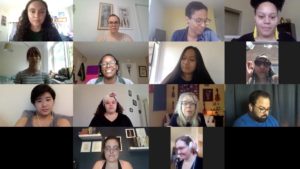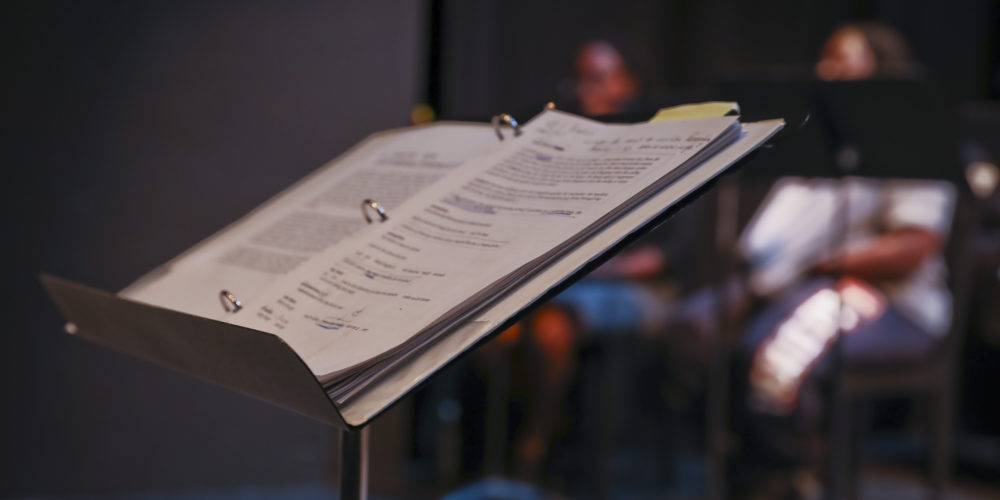17 Jul The Making of a Virtual Play Festival: The Retreat
Creating Community across the World: The BAPF Virtual Retreat
Written by Lucas Nash

We discussed jazz music and enjoyed songs by composer and bassist Charles Mingus.
The BAPF retreat. It’s an essential part of our development process. For three days, our staff and artistic teams assemble for the uninterrupted reading and discussion of our featured plays. Just as important, it’s the first chance for our staff and artists to engage with the entirety of the festival production team. Heretofore, communication between our play’s artistic teams is limited. The retreat provides the facilities for conversation. After all, we are not simply producing five plays. We are creating a festival and community centered around five playwrights and their work.
The problem is we’re not about to stuff 33 people in a room during a pandemic. Adding to this, our team members are sheltered in place across the world from all of the United States and Hong Kong. It would be ethically deplorable and physically impossible. So just as we did with the festival, we decided to bring the retreat to an online platform. 33 people. 4 time zones. Zoom fatigue. Creatives using computers. It was apparent our virtual retreat would be difficult to organize; yet not impossible. We put together four key ingredients: all artistic teams together, community spaces hosted by each team, director/playwright/cohort affinity spaces, and team time. However that couldn’t be scheduled in a normal 8 hour block. Due to aforementioned time zone differences and zoom fatigue, we contrived a schedule that catered to everyone. That meant our west coast team members would get up to meet at 7 am while it was 10 pm in Hong Kong. Our “evening” sessions would start at 4:30 pm PST which is 7:30 am in Hong Kong and 7:30 pm on the East Coast. The crazy thing is people showed up.
Our executive artistic director, Jessica Bird Beza, opened our virtual retreat with an exploration of our values. What values do we hope to embody? The group resonated with the values of communication and community. I think that speaks to the feelings of isolation we’ve all experienced. Technology brings us closer to one another, yet we must still work harder to stay connected. The retreat is a place for bonding. It’s a place to create team goals and visions of success. The expectation was that our virtual retreat would be a poor replacement for retreats of the past, that the event would lack intimacy. That couldn’t be further from the truth. We scheduled regular community spaces each hosted by one of our artistic teams. They prompted discussion from questions relating to our plays. For example, Divinia Shorter and Jordan Ramirez Puckett sparked discussion of Jordan’s play To Saints and Stars and asked us what our greatest motivations were. We showed up for some serious early morning discussion, even if some of us just rolled out of bed. In fact, one morning Director Margo Hall decided she’d like to lay back in her bed before tuning in. We learned a lot about each other simply by sharing our screens. I personally snacked during all of our Zoom calls (it helps me focus). Jessica brought us along for a morning walk and found a rafter of turkeys. Jayne Wenger, director of artistic process, and Chelsy Ricanor, operations intern, both shared their love for playing the ukulele. Our community spaces were paramount to developing the familiarity and acquaintance necessary to produce a virtual festival on a tight schedule.
After we concluded our discussion on values, Tyler English-Beckwith read her play Mingus. It was the first time many of us interns had the privilege to hear a play read by its author. Tyler exposed nuanced details that I had missed upon my first reading of her text. It also became clear the benefit of reading over Zoom: the chat box. The group could comment on Tyler’s play via the chat box without interrupting her. In past festivals, our team would gather and listen, scripts in hand, to each playwright read; besides quick exclamations, feedback was reserved for after the reading. Listeners had time to look over their notes and formulate polished responses. Our chat feed was, well, unfiltered:
“it’s the difference between a noun and a verb” hot damnnn
They want you to perform knowing it whewww
SHOUTOUT TO SHEA BUTTER
🙂
*snaps* yesss shea butter
i. was. wrong.
haha
Love a little celebration dance
Ooh we are making our way up the rollercoaster
I can hear that convo. so good
“subject with no body” ooh shivers
Those comments were all sent within 15 minutes. That’s raw, emotional reaction. Those are the typos and emoticons of electrified theatre, flung into our communal word sink without second thought. I’d like to imagine someone reading our comment threads without reading the play. Like, how do we go from shea butter to celebration dances to rollercoasters? The most productive comments were those that referred to specific quotations or moments from the play. We used carets (^) when we wanted to highlight comments that resonated with us. For example, this snippet of chat from the reading of Deneen Reynolds-Knott’s play Babes in Ho-lland:
“do a lil sumn sumn” means Taryn can COOK, imo.
^^^!
^^^^^
These scene ending lines *chef’s kiss*
This stream of comments was more than just feedback for our playwrights. It also served as communication between audience members. And we truly felt like an audience. I didn’t feel like a spectator, rather an engaged member of a collective voice. I’d argue I was more engaged than most live (like, in a room with sweaty people) performances I’ve attended. Unfortunately, this environment is hard to reproduce effectively in person. Could you imagine if an audience voiced their thoughts like we had over Zoom? Can you picture an audience member actually shouting out “SHOUTOUT TO SHEA BUTTER” in their irl, all-caps voice? It’s a luxury that Zoom and other online platforms provide. I hope that we will cultivate that same environment of open conversation during our festival performances.
The virtual retreat was a productive three-day venture that connected our cohorts and facilitated analysis of our five featured plays. It’s at this time I’d like to turn attention back to the focus of the retreat and, in fact, the entire festival: our playwrights. This retreat, while benefiting the festival team as a whole, was intended to kick start the conversation surrounding the plays. Two of our featured playwrights weigh in with their retreat experiences:
“I wasn’t emotionally prepared to see myself and other kinds of women fully reflected in our myriad of experiences and how fulfilling, inspiring, and moving that would be. Actually experiencing all the exciting femme narratives being woven by these playwrights made me realize what a deficit I’d actually been experiencing because the abundance was so emotionally overwhelming for me.”
-Noelle Viñas, author of Derecho
“It was so amazing to hear two multilingual plays in one night. It goes against what I thought american theatre to be.”
-Stefani Kuo, author of Final Boarding Call
When we finished reading Derecho and Final Boarding Call back-to-back, the room buzzed like it carried an electrical charge. We all recognized that we were participating in creating exciting, new theatre. It was an entirely new experience for everyone participating. We were privy to new plays still in development and even provided our feedback on each of the pieces. At the conclusion of our virtual retreat, our five playwrights walked away with a mountain of feedback and a fortified network of collaborators as they began their first week of rehearsals.



No Comments